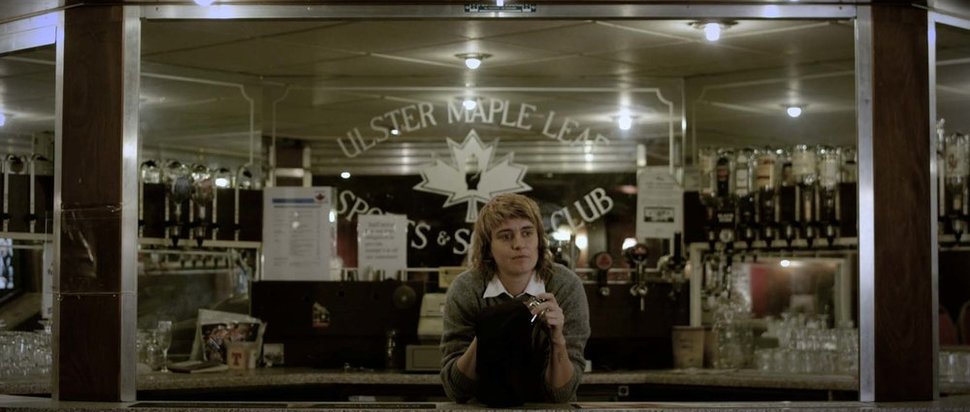Mariah Garnett on Trouble
Glasgow Short Film Festival presents Mariah Garnett's Trouble at this year's Document festival. Blending fact and fiction, it looks at the legacy of the Troubles through the lived experience of her estranged Northern Irish father. Garnett tells us more
Trouble starts with memories. We’re introduced to a 17-year-old David and his then-girlfriend. They’re both appearing in a 1971 BBC documentary, ostensibly about a couple finding love across faith divides in Belfast. David now lives in Vienna and hasn’t returned to his hometown since he was a young man. Filmmaker Mariah Garnett recounts meeting him as an adult for the first time at 27, father and daughter having communicated by letter for much of their lives.
The documentary evolved in parallel with Other & Father, a gallery show Garnett opened in Belfast. She explains, “I was always envisioning a feature film, and I made Other & Father very early in that process.” Strands of the film displayed in the show include archive footage of David from the BBC documentary, Garnett’s diary entries written on the walls, and what goes on to become one of Trouble's central conceits, Garnett performing as her father.
Early on, Garnett films David watching his appearance in the BBC documentary for the first time, decades later; “this is not my aunt,” he says partly to his daughter, and partly to the film. Placing herself in the documentary, Garnett reminds viewers that we are watching something constructed. We are reminded to be critical of what is perceived as trustworthy or neutral, as the subjectivity of its maker is foregrounded. “That has nothing to do with me,” David comments, as footage from almost 50 years before shows him loping down certain streets and murals, as if he did. Garnett suggests her interest in dismantling some kind of monolithic "truth" told by a revered institution, “stems from the way the history of queer people has been told (or, more accurately, not told).”
Trouble doesn’t just aspire to ‘walk in another’s shoes’. Garnett puts on the suit, sports her dad’s haircut of the 70s and re-enacts his original scenes. David’s voice from the first documentary is heard as Garnett performs the footage in today’s Belfast. There is a sense of desire – a need – to close a physical gulf, having not seen each other since she was a toddler. Garnett says the re-enactment approach had “an immediate impact on me and I did feel I understood him better by doing that.”
She continues, “Of course… the stakes of me walking down the street in drag after an Orange march in 2015 were much lower than my dad doing the same in 1971, but I think I understood something about him in a physical way from being in the place.” As a process, it found Garnett reaching for understanding at greater lengths, “trying to drum up fear in my own body that I wouldn't have gotten from just talking to him about it.”
Studying at CalArts, Garnett’s previous documentaries include Picaresques, Encounters I May Or May Not Have Had With Peter Berlin and Full Burn. What unites Garnett’s approach is an openness to experimentation. “I like to try a bunch of different things, and they usually all end up in the end product.” Most of these experiments have ended up in the final cut. The initial vision is fairly regular; documentary is as documentary does, but it’s the process, “where things get weird and then the challenge for me is putting all these disparate elements together.”
We see Belfast from Garnett’s perspective, new to the complexities wound within the city, as she plays out her dad’s journeys from those times. Beforehand, Garnett purposefully didn’t find out too much, “because I had some kind of vague notion that I would somehow metaphysically feel the history of the place by standing in it.” She wasn’t wrong but it didn’t feel particularly abstract. She elaborates: “the history of Belfast is very much alive in the present day.” In her time there, Garnett meets residents, attends marches and gets to meet (some) family. “In every taxi, every pub, in the graffiti, the signage, flowerpots on peoples' porches, the way certain roads are pronounced, even the bus routes – the legacy of the conflict is very much present.”
Garnett shares with us the process of relationship building, history finding, and making sense of things. Since Trouble’s making, Garnett reflects on what it’s like to put so much into your work. “It can be scary to dedicate so much… to a thing without knowing if it's going to resonate with anyone else," she says. "When I finished it, I cared a lot about if it would resonate with my dad and with folks in Belfast.”
Speaking of her dad, a crucial reviewer, this documentary is up his street. “He liked it!" confirms Garnett. "He said, 'Oh my darling what a wonderful film you've made.' That was a real relief!”
Trouble screens at Document and is followed by a live Q&A with Mariah Garnett, artist/filmmaker Myrid Carten and Berwick Film Festival's Peter Taylor
